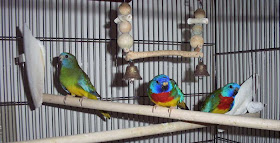 |
| Two pairs of Splendids are on friendly terms sharing a large common cage. However, when nest boxes are introduced, that could change. |
 |
| Cherry when nest box is first opened. Notice relaxed tail. |
 |
| Cherry after taking a photo with the flash. Tail is spread wide, making herself appear larger. |
Cherry, a Rosy Bourke hen, has four eggs that aren't going to hatch. Yet, she refuses to give up on them even after setting twice as long as it takes for eggs to hatch (18-21 days for Bourke eggs). I could take them away, but would hate for her to be angry with me.
Her previous clutch was also infertile, but I gave her an egg from one of her daughters who had laid it on the floor of her cage. That egg was laid about ten days later than any of Cherry's, but she stayed on it and hatched it. She raised the lone chick. She's been on these current eggs even longer, perhaps hoping beyond hope that one may just be late like last time.
 |
| This is Rhett, Cherry's mate. He's my eldest bird. |
Budgerigars also make good foster parents for any of the small varieties of parakeet. Timing is important, so my nest boxes all go back up on the cages on the same day. The hens may not all lay at the same time, but it stimulates them and they will overlap one another, making fostering (when necessary) a possibility. This way, I've been able to save many eggs from young mothers unwilling to set, or hens who suffered egg binding and recovered, but weren't up to caring for their clutch after that. Putting fertile eggs under other hens is highly successful. I usually pick an experienced hen, and/or one with only three or four eggs.
 |
| Jewel & Rainbow, Scarlet-chested parakeets. |
 |
| Recently sold Rosy Bourke youngsters. |
Have a wonderful weekend everyone!
UPDATE A FEW DAYS LATER: Cherry finally gave up. She actually had five eggs, don't know why I thought only four. Two of the eggs were actually fertile. Sad that they didn't hatch. I'm thinking that maybe I need to add Vitamin D since they are never outside, and windows filter sunlight. They have iodine and calcium available. It surprised me that this aging pair is still able to produce fertile eggs...good for them! However, could her age have anything to do with the eggs not hatching? She always kept them warm and babies were fully developed. Some kind of genetic defect from older eggs, maybe?
Hi,
ReplyDeleteI love those scarlet chested parakeets.
I read it's difficult to keep them. They are beautiful.
j.
They are a little more trouble than other varieties of parakeet, but hopefully just as healthy and hearty. I think their their active lifestyle and beautiful colors makes them worth the extra effort to keep them. However, that said, I have many Bourkes and fewer Splendids. The more you have, the more work. Smile. Bourkes are easier keepers.
ReplyDeleteShouldn't you remove the eggs if there're infertile after the 18 days? Sue
ReplyDeleteThey can take 21 days to hatch (or possibly longer if the weather's cold). Be sure you're counting days from the last egg that was laid and not the first. Hens often don't brood until their last egg is laid. Also, if some eggs hatch and others don't, unhatched eggs help keep the babies warm. I leave the eggs in the nest until a hen deserts them even when I've candled them and know they are all infertile. It's stressful to the hen when they are removed, so I allow my hens to give up on them themselves. It's traumatic for some hens to have the eggs removed if she has no babies. If she has two fertile eggs and two infertile ones, she won't notice if you take away the infertile eggs.
ReplyDeleteHowever, if a hen has two out of four eggs hatch, the extra eggs do serve a purpose in helping keep the nest warm. With my birds, if the babies are a couple of weeks old, and the old unhatchable eggs are dirty ... after all that, I am likely to remove soiled eggs (or they can be cleaned off under warm water and put back, a better option if it's cold near the nestbox, and especially if there is only one chick in the nest, the eggs will help them stay warm).
Hope this answers your question.